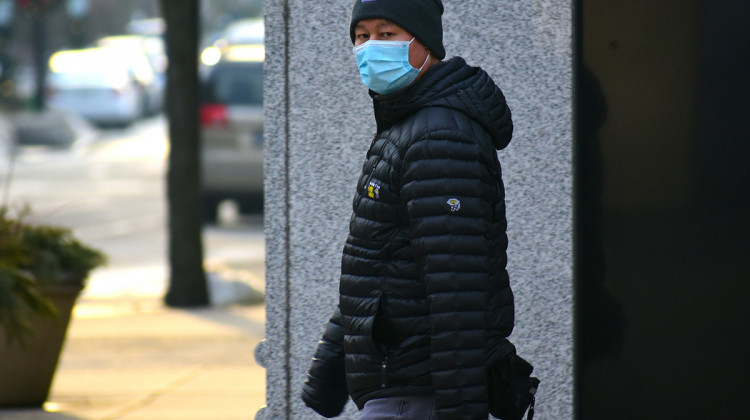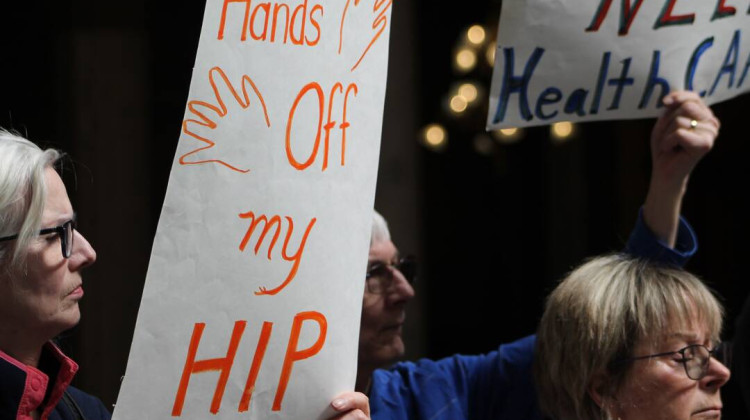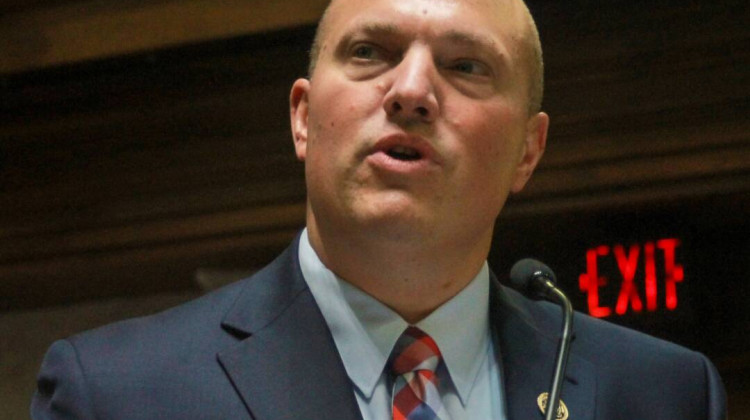
Indiana’s weekly reported COVID-19 cases dropped significantly again in the last week, reporting only 4,651 new cases.
(Justin Hicks/IPB News)The Indiana Department of Health made new changes to its dashboard. Hoosier physicians push back on Attorney General Todd Rokita’s advisory on unproven COVID-19 treatments. And Indiana has reported fewer than 1,000 new cases statewide for seven days.
THE DATA
Indiana’s weekly reported COVID-19 cases dropped significantly again in the last week, reporting only 4,651 new cases.
Hospitalizations are also down significantly – the state’s COVID-19 hospital census is at its lowest since Aug. 1, at 932. IDOH added 255 new deaths to its total in the last week.
The Indiana Department of Health announced a few new changes to its COVID-19 dashboard, and also slightly changed how it reports new COVID-19 cases. Before last week, IDOH connected cases to the date they were reported to the state.
But IDOH changed that, instead linking cases to the date of the positive test – aligning it more with how the state reports COVID-19 deaths. That change also means cases will be reported over the course of several days. IDOH’s dashboard now indicates a five-day period of preliminary data.
The state also eliminated individual positivity rates and testing data from its COVID-19 dashboard. In a statement, State Health Commissioner Dr. Kris Box said that was because of the availability of at-home tests – which are not reported to the state.
And following its announcement about ending the school COVID-19 dashboard, IDOH will replace it with a youth COVID-19 dashboard, which will be launched on Monday.
THE HEADLINES
Indiana physician pushes back on Rokita’s legal advisory on unproven COVID-19 treatments
Ivermectin and other drugs like hydroxychloroquine have become political flashpoints during the pandemic as anti-vaccine groups have falsely propagated the drugs as effective COVID-19 treatments. Up until now, there are no credible scientific studies that suggest that.
Now, an Indianapolis doctor on the COVID-19 frontlines worries a statement issued by Indiana Attorney General Todd Rokita will fuel misinformation about unproven COVID-19 treatments and sow distrust with the medical community.
On Wednesday, Rokita issued a legal opinion stating that doctors can legally prescribe ivermectin and hydroxychloroquine, which are FDA-approved for other purposes, to treat COVID-19. Five state lawmakers — Sen. Mike Gaskill (R-Pendleton), Sen. Eric Koch (R-Bedford), Sen. James Tomes (R-Wadesville), Rep. Jim Lucas (R-Seymour) and Rep. Elizabeth Rowray (R-Yorktown) — asked Rokita, a Republican, for guidance on the matter, according to a press release.
Dr. Gabriel Bosslet, a pulmonary and critical care physician and associate professor at the Indiana University School of Medicine, said Rokita’s statement was unnecessary and likely issued for political purposes.
“This statement … is stoking a group of individuals out there who feel that somehow the medical establishment has decided that it's going to avoid treating COVID-19 with effective therapies, because we have some nefarious plot to make sure that the pharmaceutical companies make a lot of money from the vaccine,” Bosslet said. “None of that's true.”
Join the conversation and sign up for the Indiana Two-Way. Text "Indiana" to 73224. Your comments and questions in response to our weekly text help us find the answers you need on COVID-19 and other statewide issues.
Bosslet said clinical trials are conducted for a reason — to ensure treatments are effective and that any potential harms are outweighed by benefits. But too often, during the pandemic, political figures have made claims about treatments without evidence to back them up.
All IN: mRNA study, COVID-19 vaccine and pregnancy
All IN learns about new research on the COVID-19 vaccine, specifically around its effectiveness over time. And they also talk to a doctor about the efficacy of the vaccine on pregnant women.
IU Health works through backlog of procedures as COVID-19 cases decline
Health systems are still struggling to keep up with demand despite declining COVID-19 hospitalizations.
Indiana University Health – the state’s largest health system – said it’s working through a backlog of delayed elective procedures.
Dr. Chris Weaver, the senior vice president of clinical effectiveness at IU Health, said those decisions are made at the individual hospital level.
"We've rescheduled some of those surgeries out, we look at that closely each and every day across each of our hospitals and make those decisions," Weaver said.
Contact Lauren at lchapman@wfyi.org or follow her on Twitter at @laurenechapman_.
 DONATE
DONATE






 Support WFYI. We can't do it without you.
Support WFYI. We can't do it without you.